Norway in 2018, Stavanger
Parts
Tuesday, August 7
My train delivered me to Stavanger in the evening, so I just found my hotel,
unpacked, and slept.
Wednesday, August 8
I bought a combined ticket for multiple Stavanger museums: the canning museum,
the maritime museum, the city museum, the natural history museum, and the
children’s museum. I think I visited at least the first two this day. Part of
the canning museum tour was given by an old guy with detailed knowledge of the
canning museum and canning history, including the machinery, economics,
international trade, and so on. It was interesting.
Besides that, I walked around town for a bit. Here are some photos from Old
Stavanger, a pond in the center of the city, and a 135-year-old Norwegian
restaurant. Or so it says; I have my doubts. At least it makes their “home of
the whopper” slogan ring true.
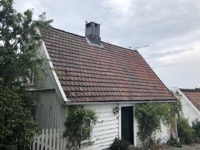 |
| Birds on roof. |
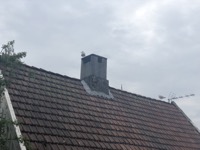 |
| Birds on roof. |
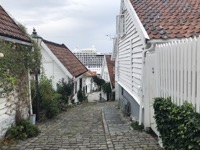 |
| Gemle Stavanger (Old Stavanger). |
 |
| Gemle Stavanger (Old Stavanger). |
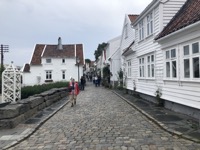 |
| Gemle Stavanger (Old Stavanger). |
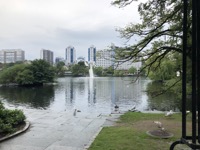 |
| Central pond. |
 |
| 135-year-old Norwegian restaurant. |
And of course there was also chocolate.
 |
| Chocolates from Chili Chocolate. |
My records suggest I also visited the Norsk Oljemuseum (oil museum) that day,
once again playing with my memory. I remember the museum, but it seems like a
lot to have done on one day, on top of the other museums.
Oil was discovered off the coast of Norway, and the government managed to keep
a lot of the profits instead of letting oil companies take it all, and now
Norway invests the funds and is wealthy (over $200,000 per resident in 2022).
Thursday, August 9
 |
| View from ferry to Tau. |
Thursday got up early, took a ferry to Tau, then a bus from Tau to the start of
a hike to
Preikestolen. In case
anybody else wants to do it in the future, I bought the ferry and bus tickets
via Go Fjords. You can probably book the
ferry and bus separately directly from their companies, but the coordinated
package worked well. Also a local transit service, Kolumbus, has a ferry from
Stavanger to Tau and likely a bus to the start of the hike (Preikestolen
fjellstue), so that may be an option.
The hike was about 2½ miles each way with a 1,070-foot elevation gain. I went
up nonstop and took photos at the end. Here are some photos from Preikestolen:
 |
| View from Preikestolen. |
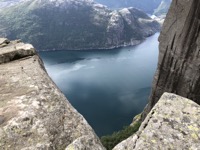 |
| View from Preikestolen. |
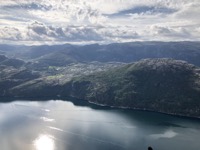 |
| View from Preikestolen. |
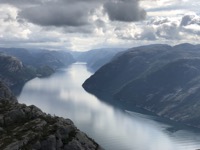 |
| View from Preikestolen. |
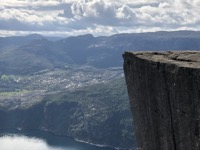 |
| View of Preikestolen. |
Those look nice, but here is a more informative view:
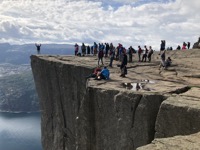 |
| Preikestolen. |
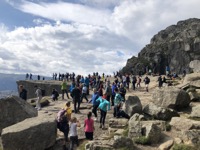 |
| Preikestolen. |
On the way down, I stopped to take some landscape photos:
 |
| From the Preikestolen hike. |
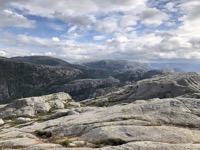 |
| From the Preikestolen hike. |
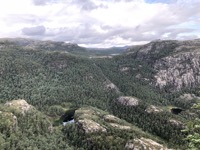 |
| From the Preikestolen hike. |
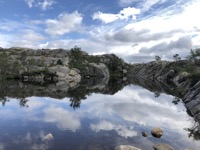 |
| From the Preikestolen hike. |
 |
| From the Preikestolen hike. |
 |
| From the Preikestolen hike. |
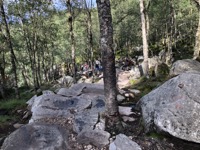 |
| From the Preikestolen hike. |
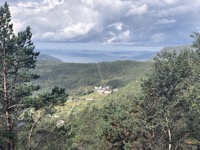 |
| From the Preikestolen hike. |
 |
| From the Preikestolen hike. |
Back in Stavanger in the late afternoon, I wandered around town a bit more:
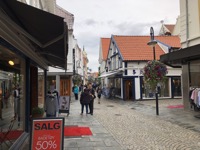 |
| Stavanger shopping area. |
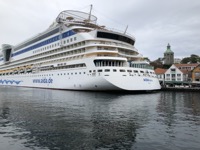 |
| Big cruise ship in little city. |
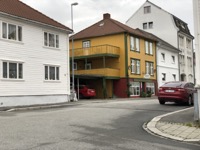 |
| Random house. |
 |
| View over the city. |
Friday, August 10
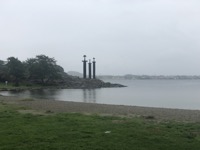 |
| Swords in Rock. |
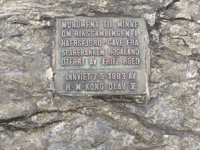 |
| Swords in Rock. |
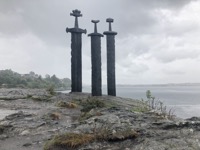 |
| Swords in Rock. |
Friday I made my way by bus to the Swords in Rock memorial.
It was raining that morning, but I seem to recall the weather improving later
in the day.
Heading back by bus, I visited a mall that happened to be near a transfer
point, and then I went to I visited the
Museum of Archeology,
which includes an Iron Age farm with reconstructed buildings. The farm dates
from 350-550 AD and includes two longhouses, at least one with a longhouse with
ten beds, and two smaller houses. The buildings included a metal workshop,
rooms for livestock, equipment storage, and food and animal feed.
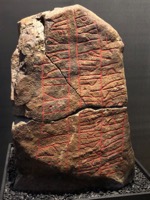 |
| Runes in archeological museum. |
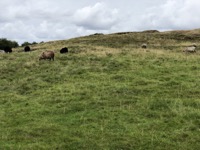 |
| Iron Age farm. |
 |
| Longhouse. |
 |
| Longhouse. |
It was a busy day, because I also visited two chocolate stores, the post
office, the Stavanger Museum, and
the Norwegian Oil Museum.
The various museums I visited over the course of the trip gave disjointed
views of history—prehistoric, viking raids and isolated settlements, early
cities, local and international trade, the 1800s, and modernity. The contrast
between historic poverty and hard lives and modern prosperity is interesting.
One of the museum exhibits said that, for a period of time, it was considered
unseemly to buy low and sell high. Money was a medium for keeping track of
exchanges, not for profiting. I am somewhat skeptical of that, at least of its
extent and prevalence.
Saturday, August 11
I took a bus to Bergen, and it took ferries at two points. These images are
from one of the ferry rides. On one of the ferries, I tried svele (pancake)
with brownost (brown cheese). It did not do much for me.
 |
| In the North Sea (just barely). |
 |
| In the North Sea (just barely). |
© Copyright 2022 by
Eric Postpischil.


































